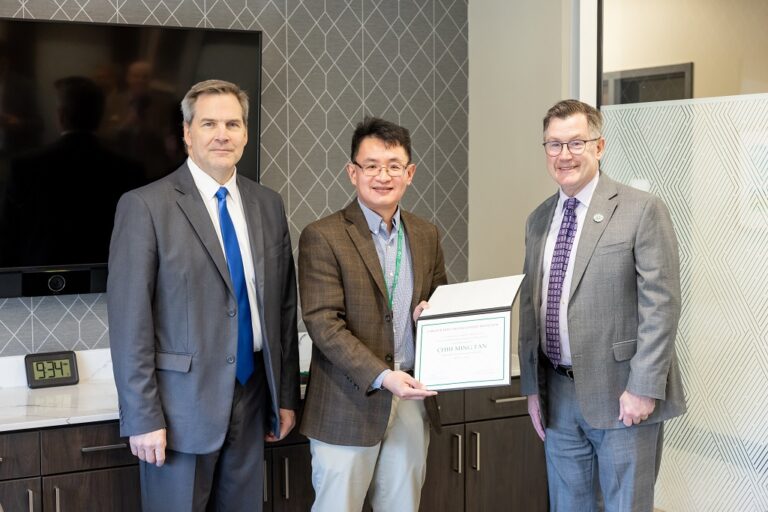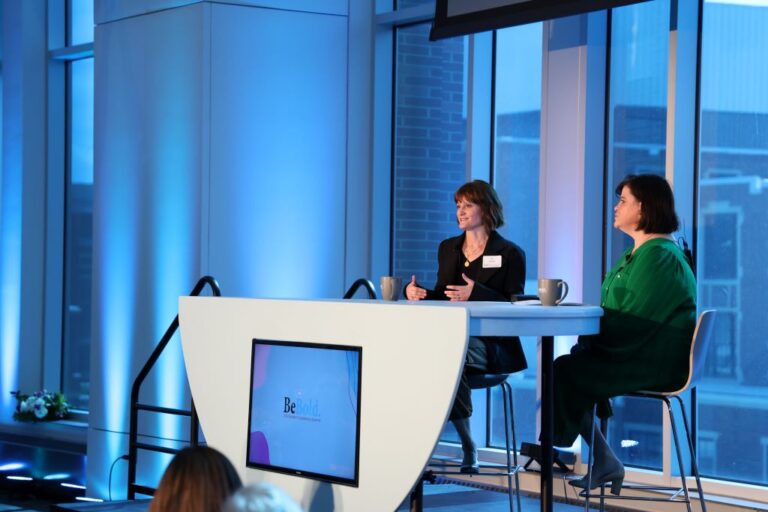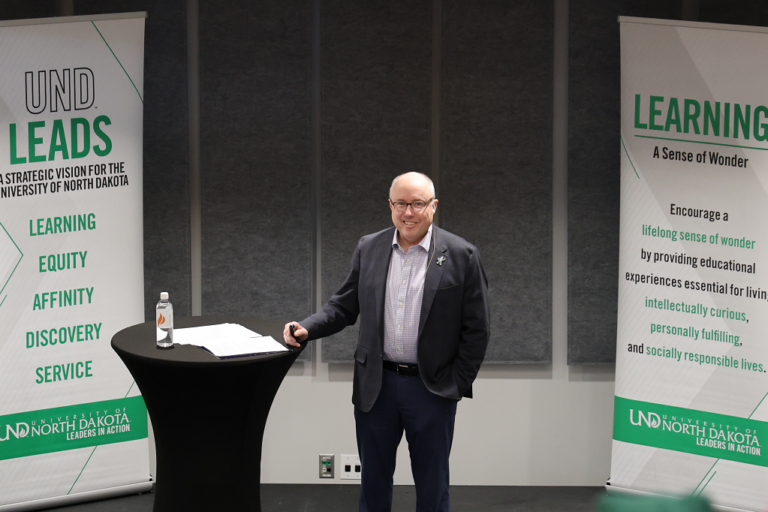Answered: What does Martin Luther King Jr.’s legacy mean to you?
Responses from UND community, including during MLK Jr. Day brunch, describe legacy of an American great

Editor’s note: On Jan. 17, Martin Luther King Jr. Day, UND President Andy Armacost and Director of Student Diversity & Inclusion Stacey Borboa-Peterson made opening remarks at the Martin Luther King Jr. Day brunch in the Memorial Union.
They shared the podium with UND student emcee Jaedon Hinds. The senior in commercial aviation and aviation management is a member of the Organization of Black Aerospace Professionals, the Black Student Association and the Latin Student Organization. He’s also a student diversity and inclusion peer educator and a member of the Black History Month 2022 Planning Committee.
Last week, UND Today asked the UND community to answer the question, “What does Martin Luther King Jr.’s legacy mean to me?” Some of the responses we received are below; and in addition, because the campus speakers at the Martin Luther King Jr. Day brunch each answered that question so vividly, we’re leading off this feature with edited excerpts of those speakers’ remarks.
***
Andrew Armacost, UND president: It’s great to be here on this day of celebration and to honor the life and legacy of Dr. Martin Luther King Jr.

I was only 5 months old when King was assassinated, yet the legacy of King certainly had a profound impact on my life. For example, I think about my childhood in Bowie, Md. My town was constructed by the Levitt Corp. It was what was known as a Levittown, which was a mass-produced community. And the Levitt Corp. initially would sell homes only to white families.
By the time my family moved in in 1971, that had changed. The schools and the community had become much more integrated, too.
And in fact, the examples that I saw at Meadowbrook Elementary School were ones of harmony. In spite of what was happening in the world, our playmates came from multiple races.
My kindergarten teacher was a Black woman by the name of Mrs. Jones — I don’t know her first name; nobody ever does with their kindergarten teacher. And our principal also was a Black woman. We knew her as our leader. She wasn’t our Black woman leader, she was our leader.
Looking back now on my childhood in Bowie, the interesting thing is that I was seeing examples of leadership across all races. We often talk about how these examples are important for young Black children growing up in the schools. For me, it was important as a young white child growing up in schools to see that example of pure leadership.
Then I moved to Milwaukee at age 10. And in that community, we had the same focus on how do we bring our schools together. We had many bright examples of leadership in our community trying to achieve that harmony, particularly in our school systems.
It is that set of experiences for me that has impacted my life. And it’s a direct result of King’s work and many others in the civil rights community.
So each time this year, I think and reflect upon my life experience. But I also think of King’s words in the famous “I Have a Dream” speech. There’s a phrase that always has caught me; and let me share it with you.
It says when the architects of our great Republic wrote the magnificent words of the Constitution and the Declaration of Independence, they were signing a promissory note to which every American would fall heir. This note was a promise that all men, yes, Black men, as well as white men, would be guaranteed the inalienable rights of life, liberty and the pursuit of happiness.
King also went on to say that although the government had written a bad check to his people, “we refuse to believe that the Bank of Justice is bankrupt.” I’m here today to tell you that UND pledges its commitment, to make sure that bank issues on this promissory note the promise for opportunity for all and the promise for a campus free from discrimination, a campus that supports each and every one of its members.
I’m delighted to be here today. Let’s celebrate Dr. King’s rich legacy by living out the great example of love and peace with each other.
***
Stacy Borboa-Peterson, director of Student Diversity & Inclusion, speaking at the Martin Luther King Jr. Day brunch:

In 2002, Richard Lischer, a professor of preaching at the Duke Divinity School, shared a sermon titled “The Weapon of Love,” a phrase King used early on in his preaching.
Lischer recounted King’s use of the word agape, a classical Greek word that means unconditional love, which King believed should extend to all humankind. Lischer stated that love takes shape as a tool for change, asking those who hear the message to take up the weapon of love.
King spoke often of the power of love, saying “you only need a heart full of grace … a soul generated by love” and “I have decided to stick with love … hate is too great a burden to bear.”
Our own leader, President Armacost is known for saying and living the message “love your people.” On this Martin Luther King Jr. Day of service, I ask that folks take up the weapon of love, denounce hate and love people.
***
Jaedon Hinds, UND student emcee, Martin Luther King Jr. Day brunch: Dr. Martin Luther King Jr. was a man who wasn’t afraid to fight for social change, even when the rest of the world violently opposed his ideals and dreams. His leadership set an example to all people on how to approach a fight when it comes to social inequity.
Through the use of nonviolent means, King sought to use the power of words with the expressions of dignity, respect, education, determination and faith as a way to fight for change.
He dedicated himself to the service of his community. And today we’re here to celebrate some of those who have continued King’s legacy, not only by recognizing the need for social change, but also by dedicating themselves to the service of their own communities.
Martin Luther King Jr. Day is considered to be a holiday federally recognized as a day of service. With today’s speakers and events, we hope this to be an encouragement for you to continue King’s legacy by finding your own ways to provide service for your communities.
***

Dr. Martin Luther King Jr.’s life and legacy stand as an enduring source of inspiration for all of us. Martin Luther King Jr. Day provides us with an opportunity not only to celebrate Dr. King’s leadership and to recognize the historical importance of his life’s work but also to take time to reflect and take action on the work that remains.
Our collective commitment to civil rights for all and an end to inequities and racism in this country and across the globe is ongoing work. Honoring the day by answering the call to service and working to better our communities is a truly fitting way to celebrate Dr. King’s legacy.
— Eric Link, UND provost
***
Dr. Martin Luther King Jr. spoke his vision of true equality, an ideal toward which we should all aspire. In celebrating his legacy every year, we can measure our progress in achieving Dr. King’s dream, both as a society and as individuals.
As UND students, we must address discrimination when we see it and reflect on our own internal biases and behaviors. By working to become better people, we can honor Dr. King’s legacy every day of the year.
— Kaelan Reedy, UND Student Body president
***
I think the most impactful part of Martin Luther King Jr.’s legacy to me is remembering that the work isn’t over. Dr. King kept marching, speaking and organizing until the day he died; there was, and is, more to do.
Dr. King dreamed of a nation in unity, but we are still very much divided. In addition to organizing for civil rights, Martin Luther King Jr. was an outspoken advocate for ending poverty and reducing wealth inequality, and the gap between average Americans and the wealthy has grown only wider. We should take this day to not only celebrate the life and successes of Dr. King but also to reflect on the fact that his mission never was completed.
It is up to us to keep advocating for freedom for all people, not only from racial or other types of discrimination, but from the chains of poverty as well.
— Dawson Dutchak, UND Student Body vice president
***
In response to UND Today’s request for thoughts on Martin Luther King Jr.’s legacy, former North Dakota Gov. Ed Schafer sent us a copy of the remarks that he delivered on Martin Luther King Jr. Day in 2016, when Schafer was serving as president of UND. Schafer spoke at the Empire Theater in Grand Forks, where commemorative events were held. Edited excerpts of Shafer’s remarks follow.

Just a year before the Selma marches, in 1964, when I was a freshman at UND, Dr. King won the Nobel Peace Prize.
He was selected specifically because of his efforts to combat racial inequality through nonviolent means. Martin Luther King’s peaceful message of inclusion and cooperation is one that we can all benefit and learn from still today. More than 50 years later, Dr. King’s words and actions still ring true.
***
A lot of years have passed since 1965, and while much progress has been made, the march is not over. Dr. King’s message of peaceful but relentless efforts to bring about needed change continues to hold true. And as we remain on this journey, I’m proud of the role that education plays.
A quote from Martin Luther King, Jr.:
“As long as the mind is enslaved, the body can never be free. No emancipation proclamation, no civil rights bill can totally bring this kind of freedom.”
“Man will only be free when he reaches down to the inner depths of his own being and signs his own emancipation proclamation, and education is one way to do that.”
— Ed Schafer, former North Dakota governor and UND president
***
As I grew up in rural Alabama, the Rev. Martin Luther King, Jr.’s words, ideas and inspiring legacy of political activism were always in the background of my cultural, educational and moral development. But sadly, it wasn’t until I was in college that I first read one of his writings – “Letter from Birmingham City Jail” – in full.

That brilliant piece of writing made a huge impact on how I understood moral courage, the role of creative tension, and the importance of philosophical questioning, especially to challenge oppressors and various forms of oppression. I have since taught this letter to my own students at UND, and we frequently note how the principles he describes are as relevant to us today as they were to audiences in April 1963.
Some of these important realizations include:
- “Freedom is never voluntarily given by the oppressor; it must be demanded by the oppressed.”
- “There is a type of constructive nonviolent tension that is necessary for growth … We must see the need of having nonviolent gadflies to create the kind of tension in society that will help men to rise from the dark depths of prejudice and racism to the majestic heights of understanding and brotherhood.”
- “Like a boil that can never be cured as long as it is covered up but must be opened with all its pus-flowing ugliness to the natural medicines of air and light, injustice must likewise be exposed, with all of the tension its exposing creates, to the light of human conscience … before it can be cured.”
- “An unjust law is a code inflicted upon a minority which that minority had no part in enacting or creating because they did not have the unhampered right to vote.”
- “… Human progress never rolls in on the wheels of inevitability… We must use time creatively, and forever realize that the time is always ripe to do right.”
— Rebecca Rozelle-Stone, professor of philosophy and director of the Honors Program
***
From Martin Luther King Jr., I learned how important it is to provide good educations to young people in the Black community. I had received a nearly free engineering degree at UND (thanks to federal grants and loans, paid back within a year of graduation), and I knew this was what the Black community needed. I’ve fought for this right of educational access ever since, exhorting friends and politicians to rise to the challenge. This insight and attitude are part of King’s legacy.
— Kevin Kiefer, UND Class of 1972



